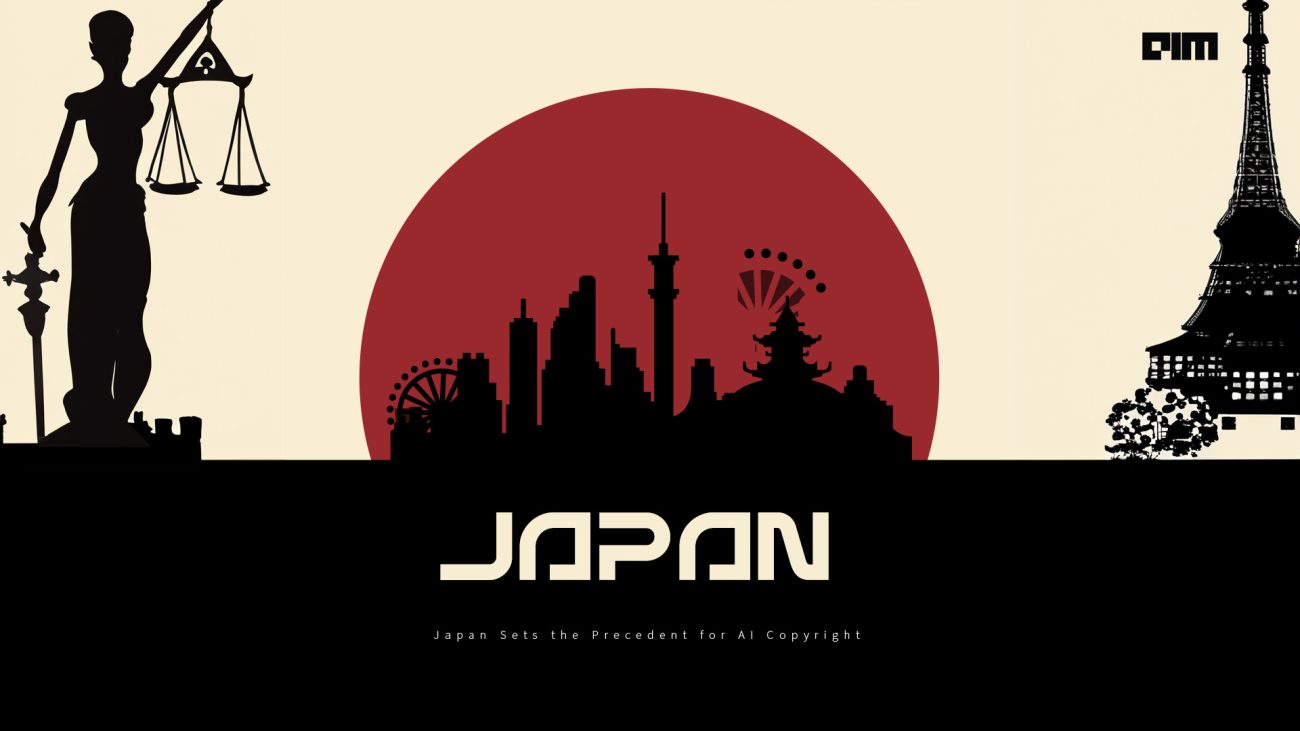|
Listen to this story
|
Whatever generative AI technology we talk about, when we discuss the datasets that go in building it, we stumble upon the question of copyright. While the governments across the world discuss what needs to be done to solve this problem, Japan has come to a conclusion already – copyright does not apply to AI training.
The policy grants AI unrestricted access to all data, regardless of its purpose (non-profit or commercial), the nature of the act (other than reproduction), or the source (including illegal sites). Keiko Nagaoka, the Japanese Minister of Education, Culture, Sports, Science, and Technology, reaffirmed this position during a local meeting, stating that Japan’s laws do not offer protection to copyrighted materials incorporated into AI datasets.
While this can be very concerning for everyone who has been discussing the issue, Yann LeCun, the chief of Meta AI, now calls Japan a ‘machine learning paradise’. He explains how the very essence of intellectual property is defined by individual governments. “The driving principle is to maximise the public good, not to maximise the power of content owners,” he adds.
Japan has become a machine learning paradise. https://t.co/uUWMvRmULX
— Yann LeCun (@ylecun) June 1, 2023
This is perfectly in line with the Japanese government’s push towards generative AI, and more specifically, building something similar to OpenAI’s ChatGPT. Prime Minister Fumio Kishida has been actively talking to experts to discuss the potential and risks of such technology and build frameworks for the development of such a chatbot as soon as possible.
This was in line with Sam Altman visiting Japan to meet Kishida to expand and start expanding OpenAI’s office in Japan.
In recent news, Japan’s privacy watchdog has issued a warning to OpenAI, cautioning them against collecting sensitive data without individuals’ consent. The Personal Information Protection Commission has advised OpenAI to limit the amount of sensitive data it gathers for machine learning purposes. In their statement, they also mentioned the possibility of taking additional measures if further concerns arise.
Japan vs the world
Though Altman visited Japan and spoke to the government about how he wants to build something for the people of Japan and focus on the Japanese language, he has also been in talks with the White House and the U.S. Senate about enforcing regulations on AI.
In one of the points, he spoke about how copyright is an important part and attributing the original creators is something the company is actively researching about. “I think people totally deserve control over how their content and likenesses are used in this technology,” he spoke in the U.S. Senate.
The Japanese government’s move towards AI copyright and regulation might be risky, but can be ethical for AI developers at the same time. If the government is granted the authority to regulate AI development under the guise of “protecting” copyright owners, it would effectively halt the rapid advancements in AI models. This is possibly the case when it comes to the U.S. trying to impose a social media like bill on AI.
Senator Hawley’s statement in the U.S. Senate suggests that the government intends to enforce a complete copyright prohibition on generative AI models. This approach is problematic as it fails to address the underlying concerns and instead establishes governmental control over AI. Is this truly the outcome we desire?
David Holz, the founder of Midjourney, doesn’t really care about copyright infringement. In an interview with Forbes, Holz said that he is using images without seeking permission from the owners. He explains that it is impossible to do so with the huge dataset. That is what probably the Japanese government wishes to pursue and ponder on.
What to expect?
When it comes to Japan and its own big-tech, SoftBank Corporation, the investor and the tech-giant has started its pursuit towards AI. It recently announced its partnership with NVIDIA to build generative AI applications in Japan. The company is planning to build data centres built on NVIDIA’s GH200 Grace Hopper Superchip.
An argument for removing copyright rules for AI is that Japan wants to go all-in and opt out of the copyright approach and stay ahead of the competition. With NVIDIA and Softbank’s partnership, the country might soon be able to develop its own technology which might serve the country or go global.
As I predicted, once one country does this the others will need to go all in on it too, or risk becoming an AI backwater.https://t.co/F1PssWRFll
— Daniel Jeffries (@Dan_Jeffries1) May 31, 2023
But on the flip side, not everyone is on the government’s side. Anime and graphic art creators are concerned about the decision and worry that this might lower the value of their work. On the contrary, academic and business leaders are happy that the government is leveraging its relaxed data laws to lead to global AI dominance.
On the global scale, Japan might either become a rogue nation or set itself as the precedent for how the world sees AI copyright in the future. Until now, the other side was China, hopefully it does not become Japan.





















